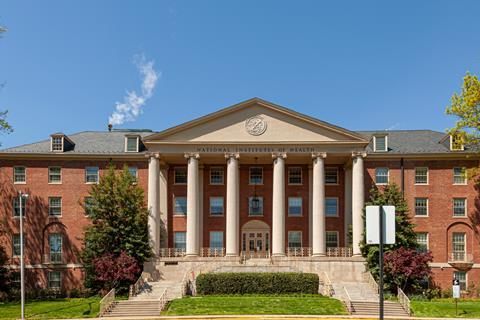The Stem professionals thriving in careers at the intersection of science and society
A few years ago, Beth Thompson led a coalition of medical and patient advocacy organisations that opposed a set of amendments to the EU’s General Data Protection Regulation. Introduced by the European Parliament to protect the privacy of research participants, the modifications would have hampered research across the region.
Thompson was a policy adviser at the UK-based charity Wellcome at the time. Under her guidance, the group rigorously campaigned online and engaged with policymakers across EU institutions to voice their concerns. The amendments were eventually overturned. ‘It was so rewarding to see that group come together and ultimately be successful,’ says Thompson. The final legislation adopted a fair approach that protected participants’ information without compromising research efforts.
Initially trained as a scientist, Thompson crossed over to – and found fulfilment in – the field of science policy. For researchers and students eager to leverage their scientific expertise to solve the world’s biggest problems, a career in science policy is worth exploring.
A natural inclination to serve the public
Science policy is an amorphous field with employment opportunities scattered across sectors. Government officials seek policy specialists’ advice on climate, data, health and emerging tech issues. Specialists can be found analysing policies affecting different sectors at think tanks. Companies also need individuals who are well-versed in policy matters to keep tabs on regulations that impact their businesses. People with a scientific background often bolster policy advocacy work at environmental and global health nonprofits. Government agencies that oversee regulation around research also hire policy experts.
For scientists who take the policy route, the shift often begins during their research years as they reflect on the role of science in shaping society. ‘I enjoyed the research process. But I guess there was, to some extent, both a push and a pull into something else,’ says Thompson, now Wellcome’s chief strategy officer. She discovered while teaching undergraduates during her PhD that she had stellar communication skills. ‘I felt, actually, perhaps I had this set of strengths that would be better used elsewhere,’ she says, adding that the precarity of scientific careers had also been weighing on her.

Lyric Jorgenson, head of science policy at the National Institutes of Health (NIH) in the US, experienced a similar ‘shifting moment’ during graduate school. Jorgenson had been pursuing a doctorate in neuroscience, focusing on how maternal health affects the developing brain. During this time, she learned that iron-deficient babies are more vulnerable to lead poisoning, especially if they don’t have access to high-quality nutritional food. When she interacted with doctors at medical conferences, Jorgenson discovered they weren’t always aware of the link.
She notes that physicians are often so focused on providing medical care to patients that they have limited time to keep track of the latest medical science. ‘How do you take that research finding and turn it into something tangible so that doctors and families can make [informed] choices?’ she wondered at the time.
Although they may not directly apply the scientific knowledge gained during their research years, scientist-turned-policy experts find their training invaluable in this career. ‘My scientific background helps me within Wellcome and with the kind of the science audiences that I’m engaging with because it gives me that baseline understanding of how these things work,’ says Thompson.
Michael Fernandez, director of the AAAS Center for Scientific Evidence in Public Issues, says the analytical thinking skills they gained from scientific training are highly beneficial in helping them break down different issues. ‘It’s really understanding what the real challenges are and the possibilities of things one can do,’ says Fernandez.
Making science palatable for decisionmakers
Some policy analysts may be strictly tasked with researching and writing detailed analyses. Others may have more multi-faceted roles that involve convening, implementing grassroots programmes, managing grants and coordinating strategic partnerships.
At the NIH, one of Jorgenson’s primary responsibilities is crafting policies around how biomedical research is conducted. Policymakers in leadership roles, like Jorgenson, face unique challenges. ‘Some days you wake up, and there is something that has happened nationally or globally that we need to think about and address,’ she says. In such instances, she faces the dual responsibility of tackling immediate events, such as Covid-19, without disrupting the organisation’s ongoing programmes.
At the AAAS Center for Scientific Evidence in Public Issues, Fernandez spearheads their team’s initiatives to bring officials in federal and state governments and governmental agencies up-to-speed with the latest science on complex societal matters. For example, the team convenes meetings and workshops to facilitate interactions between scientists and policymakers. Some of their recent initiatives have revolved around per- and polyfluoroalkyl substances (PFAS), also called ‘forever chemicals’. The organisation helped the state of Colorado’s regulatory agencies upgrade their action plan to regulate PFAS. It is also assisting other states in understanding the science of PFAS in private drinking water wells – an area that does not fall under federal or most state regulations – and PFAS in biofertilisers.
As the centre’s director, Fernandez also devotes considerable time to strategic thinking and addressing questions such as: ‘What does the future of this centre look like? What does the future of science policy work at the AAAS look like?’ Mentoring team members is also one of their priorities. ‘I spend a lot of time both one-on-one and in groups with people in my team, talking about what we’re doing and helping them find the right resources for their work.’
At Wellcome, a significant part of Thompson’s role also involves guiding the teams that report to her and offering strategic insights to support their projects. One of her main areas of focus is addressing issues around R&D policy to create a conducive environment for research. She frequently speaks at events on the organisation’s behalf.
As the director of applied research initiatives at US-based environmental advocacy nonprofit Natural Resources Defense Council’s (NRDC’s) Science Office, Vijay Limaye’s multi-faceted role spans across India and US and involves elements of applied research, policy advocacy and communication around the health impacts of climate change. For example, as part of his policy advocacy work in the US, Limaye spends considerable time engaging with federal agencies, such as the Environmental Protection Agency, by providing technical comments on proposed rules and briefing members of Congress on environmental and public health matters. ‘All of these things can help translate the science out there in peer-reviewed journals to policymakers who largely are not scientists,’ Limaye says.
How to break into science policy
People with science degrees are increasingly pursuing careers in policy. If you’ve decided it’s the path for you, it’s time to start doing the groundwork to land and succeed at your first job.
Tap into your network: Hunt down people in your professional community whose jobs have some components of policy. ‘Ankita Singh, program manager at the Indian nonprofit Foundation for Advancing Science and Technology, says it’s important to understand the type of jobs others are pursuing and then assess if they align with your interests. ‘It’s a big domain, and the nature of the work that you do here is also very varied,’ Singh says. ‘You could be in a grassroots organisation, doing a very execution-based thing or you could be in a think tank writing reports, doing analysis.’
Find a fellowship: Many people find exciting opportunities in the field after they complete a policy fellowship. The AAAS Science & Technology Policy Fellowships have launched the careers of many successful policymakers. Many professional societies, such the American Chemical Society (ACS), also offer policy-focused programmes for scientists.
Learn to compromise: Don’t be too picky when considering jobs initially, warns Beth Thompson, Wellcome’s chief strategy officer. ‘It doesn’t matter whether it’s chemistry or something else; it’s the policy bit that’s important, so try to set aside some of your passion to get your foot in the door. Then you can find your way back to that real passion later,’ she says.
Practice communication skills: In the policy field, one must quickly distil complex scientific information into simple language, says Lyric Jorgenson, head of science policy at the US National Institutes of Health. Try explaining scientific concepts to non-scientists in your neighbourhood and social circles, she says. See if you can demystify the topic for them.
Get involved: Kristin Dortch, an associate director for policy and communications at the Centers for Disease Control and Prevention, benefitted from her volunteer experience as the chair of the ACS Women Chemists Committee. She says these roles allow individuals to develop leadership, communication and project management skills while gaining experience of developing organisation policy statements and serving on governance boards. Vijay Limaye from NRDC’s Science Office also suggests providing comments on proposed regulations during public comment periods.
Braving a brand-new world
Individuals who cross over to policy from science can sometimes struggle with certain aspects of this type of work. ‘I think one of the hardest challenges I have faced is that you want to know everything you can about a single thing,’ says Jorgenson. New starters need to get comfortable broadening their knowledge base and then learn to tap into their network of subject matter experts on specific topics when needed.
A solid scientific background doesn’t always guarantee success in policymaking. ‘You don’t know everything. There’s a whole world that you don’t know in the policy world,’ says Fernandez. Moreover, Thompson says a lot of unlearning and relearning is in store for those who jump careers. ‘You do lots of writing as a researcher but have to learn how to write again in a completely different style once you move into policy,’ she says.
Moreover, according to Fernandez, a mental shift needs to occur regarding how one thinks about and discusses scientific topics. ‘You have to think about how you can talk about science in a way that is accessible, understandable and compelling for policymakers and others who aren’t active scientists,’ says Fernandez. This means focusing on the broader implications of science and its relevance for policymaking.
Even for those who’ve found success, challenges abound. ‘We’ve never had so much science published so quickly, and part of my job is to stay on top of the science and understand what it means, which can be very challenging and time-consuming,’ says Limaye. In the age of tech tools such as generative AI, he says, people working in the field must thoroughly vet the material they speak about.
I feel more connection to the real-world impact
Beth Thompson, Executive Director of Policy and Partnerships at Wellcome
Matthew McKinzie, senior director for data and policy analysis in NRDC’s Science Office, says policy professionals must be patient, as policymaking can be arduous and slow. ‘You want to change the world for good, and that’s a very hard task,’ says McKinzie. It can take years before a team experiences a policy-related win, such as a new regulation or a government incentive. He adds that changing political climates can also impact organisations’ work: ‘As an environmental advocate, one has to be conscious of who the decision-makers are and whether they share your values about protecting the natural systems on which all of us depend.’
Moreover, political awareness is vital in this field, says Frederic Sgard, project administrator at the Global Science Forum secretariat, which is a part of the Organisation for Economic Co-operation and Development, an intergovernmental organisation with 38 member countries. ‘Politics plays a role in policy. That does not mean you should be engaged in politics, but you must be aware and understand how it works,’ Sgard says.
Despite its myriad challenges, a career in policy can be gratifying for those committed to social causes. ‘What I find thrilling is when you feel like your work has contributed to changing the world,’ says McKinzie. Similarly, Fernandez says they are most proud of the moments ‘when we were ahead of the curve, understood what was coming, and were able to help people be prepared for it’.
One of the perks of working in policy, specifically advocacy, is the enormous freedom to engage with the media and the public. ‘To me, one of the reasons I got into this business and am so happy to be working with this policy/science interface is that I have real opinions about where the world is at and where it needs to be and how science can help make that transition possible,’ says Limaye.
Thompson relishes the ‘big picture view of science’ that her current role provides – something she may not have achieved working on a specific problem in the lab. ‘I feel more connection to the real-world impact and the difference that I can make, and that is really important to me,’ she says, adding that she is grateful to have found the sweet spot of her intersecting interests. She doesn’t regret the risk she took to transition into science policy: ‘It felt like a gamble, but it was so worth taking.’

















No comments yet